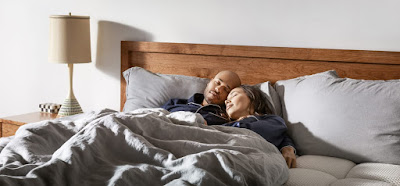9 Facts That Show How Sleep Can Affect Your Job
For all the times you pulled an all-nighter to make a deadline or send the 99th email for the sake of clarity, you deserve to spend Labor Day in bed. Bonus: Getting more rest could actually boost your work productivity (your boss would be thrilled). These nine facts reveal the impact of sleep on the job.
1. Lack Of Sleep Could Be The Reason Your Manager Is So Moody
Studies show that sleep-deprived managers exhibit less emotional control and can act emotionally abusive toward employees. Next time your boss blows up on you for no reason, remind her (respectfully) of the stress-relieving benefits of sleep.
2. Sleep-Deprivation Can Hurt The Economy
Americans are working longer hours than ever before, but it’s not necessarily a good thing, research shows. On average, the U.S. loses 1.2 million days of work each year due to employees reporting insufficient sleep.
3. A Cat Nap At Work Can Make You More Productive
Post-lunch drowsiness isn’t a myth. Our inner body clock starts to wind down between 2pm and 3pm. Don’t fight it. Taking a 20-minute power nap can improve your job performance by up to 34 percent, experts say (hint, hint: Human Resources).
4. Corporate Nap Pods Are Here
Designed for sleeping at work, EnergyPods put you in a zero-gravity sleeping position and feature guided meditations that lull you to sleep. Subtle lights and vibrations gently wake you up, so you won’t snooze through your afternoon meeting. At $13,000 a piece, it’s probably the priciest chair nap you’ll ever take.
5. Shift Work Sleep Disorder (SWSD) Is Real
People who work nights, early mornings, or rotating shifts may experience SWSD symptoms, such as insomnia, excessive sleepiness, and even microsleeps, when you nod off for a few seconds without realizing it. One way to combat these symptoms: Setting up a strict napping schedule, experts say.
6. Insomnia Decreases Work Productivity
According to a recent study, participants who slept between five and six hours each night reported a 19 percent reduction in productivity at work, compared to people who slept between seven and eights hours regularly. Those who got less than five hours of sleep reported a work productivity loss of 29 percent.
7. Being Overworked Can Increase Health Risks
More than 85 percent of men and 66 percent of women in the United States work more than 40 hours a week, and the effects can be serious. According to reports, overworked employees are more likely to have high stress levels, make poor food choices, and be more sedentary, compared to those who work less.
8. A Japanese Company Is Incentivizing Employees To Sleep
Your job’s health benefits may include discounted gym memberships and other wellness incentives. But one Japanese employer has upped the ante. Employees at Crazy Inc. who sleep an average of six hours five nights a week are awarded points they can redeem for food in the company’s cafeteria. Where do we sign up?
9. Certain Cities Are Better For Sleep
Ready to relocate for work? When you consider light pollution, traffic noise, and an overall peaceful environment, San Antonio, San Francisco, Indianapolis, and Denver are the most restful cities. Our headquarters is in San Francisco, which clearly explains why we’re so well-rested (kidding). We’re still sleeping in on Labor Day.
View original content to download multimedia @ DreamCloudSleep.com OR https://www.dreamcloudsleep.com/posts/9-facts-about-sleep/
1. Lack Of Sleep Could Be The Reason Your Manager Is So Moody
Studies show that sleep-deprived managers exhibit less emotional control and can act emotionally abusive toward employees. Next time your boss blows up on you for no reason, remind her (respectfully) of the stress-relieving benefits of sleep.
2. Sleep-Deprivation Can Hurt The Economy
Americans are working longer hours than ever before, but it’s not necessarily a good thing, research shows. On average, the U.S. loses 1.2 million days of work each year due to employees reporting insufficient sleep.
3. A Cat Nap At Work Can Make You More Productive
Post-lunch drowsiness isn’t a myth. Our inner body clock starts to wind down between 2pm and 3pm. Don’t fight it. Taking a 20-minute power nap can improve your job performance by up to 34 percent, experts say (hint, hint: Human Resources).
4. Corporate Nap Pods Are Here
Designed for sleeping at work, EnergyPods put you in a zero-gravity sleeping position and feature guided meditations that lull you to sleep. Subtle lights and vibrations gently wake you up, so you won’t snooze through your afternoon meeting. At $13,000 a piece, it’s probably the priciest chair nap you’ll ever take.
5. Shift Work Sleep Disorder (SWSD) Is Real
People who work nights, early mornings, or rotating shifts may experience SWSD symptoms, such as insomnia, excessive sleepiness, and even microsleeps, when you nod off for a few seconds without realizing it. One way to combat these symptoms: Setting up a strict napping schedule, experts say.
6. Insomnia Decreases Work Productivity
According to a recent study, participants who slept between five and six hours each night reported a 19 percent reduction in productivity at work, compared to people who slept between seven and eights hours regularly. Those who got less than five hours of sleep reported a work productivity loss of 29 percent.
7. Being Overworked Can Increase Health Risks
More than 85 percent of men and 66 percent of women in the United States work more than 40 hours a week, and the effects can be serious. According to reports, overworked employees are more likely to have high stress levels, make poor food choices, and be more sedentary, compared to those who work less.
8. A Japanese Company Is Incentivizing Employees To Sleep
Your job’s health benefits may include discounted gym memberships and other wellness incentives. But one Japanese employer has upped the ante. Employees at Crazy Inc. who sleep an average of six hours five nights a week are awarded points they can redeem for food in the company’s cafeteria. Where do we sign up?
9. Certain Cities Are Better For Sleep
Ready to relocate for work? When you consider light pollution, traffic noise, and an overall peaceful environment, San Antonio, San Francisco, Indianapolis, and Denver are the most restful cities. Our headquarters is in San Francisco, which clearly explains why we’re so well-rested (kidding). We’re still sleeping in on Labor Day.
View original content to download multimedia @ DreamCloudSleep.com OR https://www.dreamcloudsleep.com/posts/9-facts-about-sleep/





Comments
Post a Comment